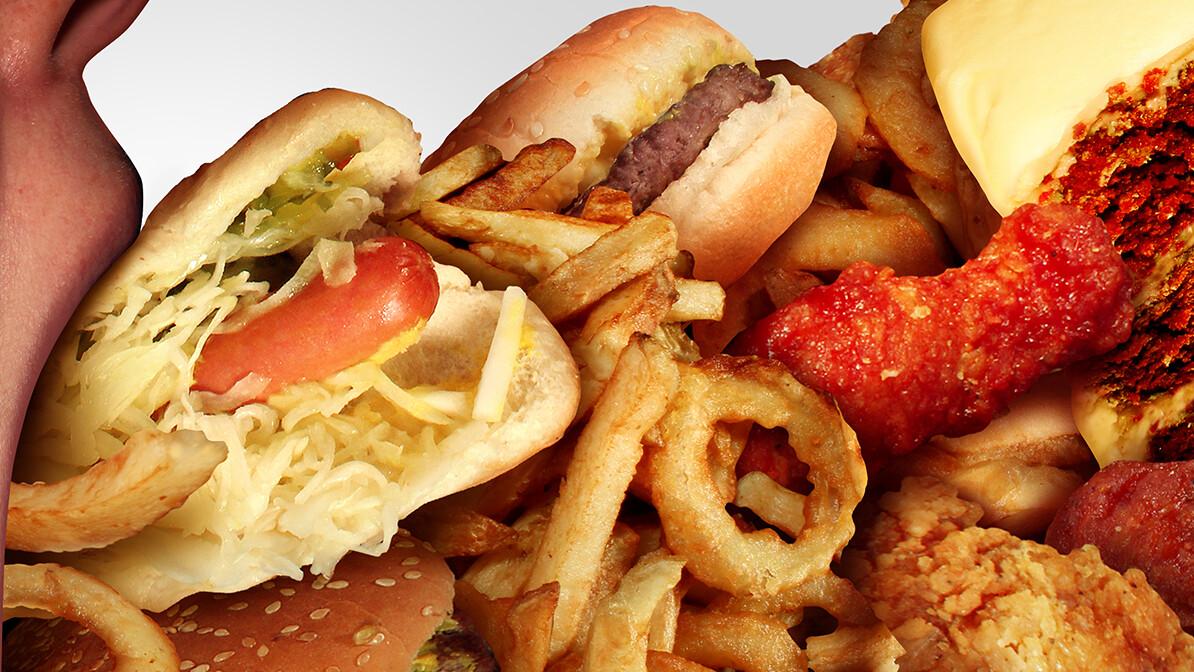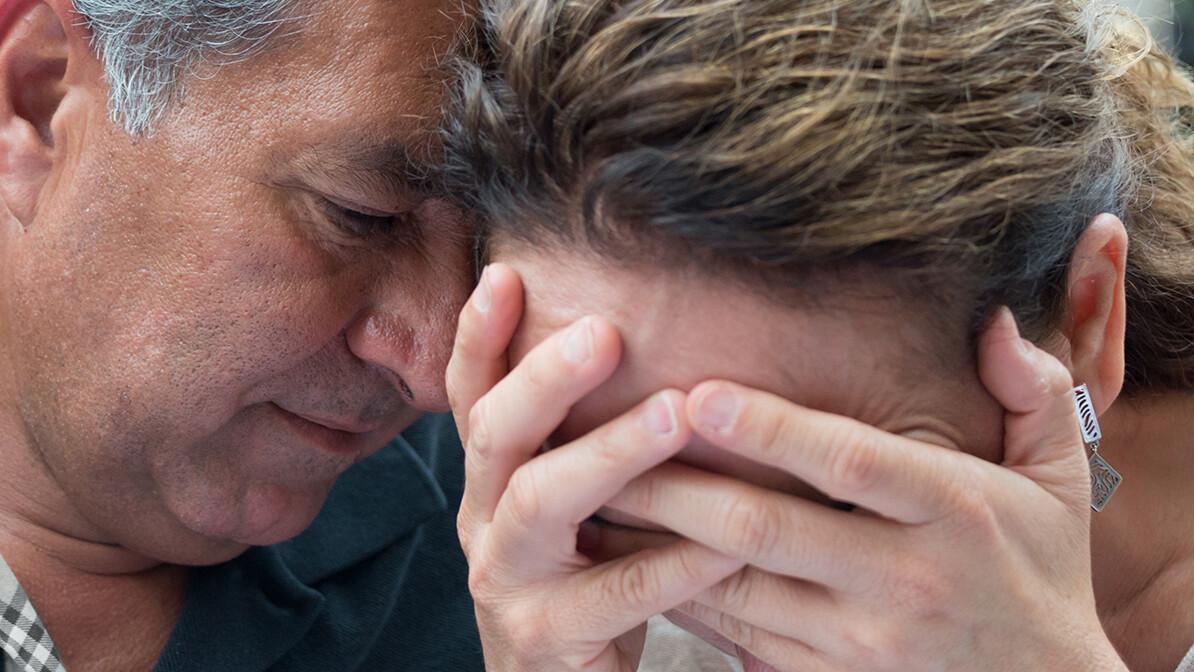
Destructive Eating Behaviors (Part 2)
Excerpt from Love to Eat, Hate to Eat: Breaking the Bondage of Destructive Eating Habits by Elyse Fitzpatrick
Self-Centered Laws
Marlene’s god, “I must be thinner than my sisters,” had also created commandments that she had to follow. These laws were: “Thou shalt not eat sugar,” “Thou shalt not eat potato chips,” “Thou shalt burn off at least 500 calories in exercise every day.” She felt more peaceful, more in control, when she followed these laws. The problem was that she could never perfectly satisfy her god’s demands because idols are never satisfied with your version of perfection. No, idols create laws that multiply exponentially. At one time it had been all right for her to eat some sugar as long as it wasn’t chocolate. Eventually, all sugar became unlawful. When Marlene didn’t obey these laws, she experienced a greater sense of futility, anger, and desperation. Let me illustrate Marlene’s problems this way:
Her god:
“I must be thinner than my sisters”
created her god’s laws (which had to be perfectly obeyed):
- Thou shalt not eat sugar.
- Thou shalt not eat potato chips.
- Thou shalt exercise off 500 calories per day.
When Marlene “sinned” and violated the laws she had devised in her heart, she would usually respond by feeling angry and, in despair, giving in to her self-indulgence. However, there were some days when she would “regain control” and would respond by rededicating her efforts to be “perfect” for the rest of the day, by exercising more than usual to make up for her mistake, and by promising to be very careful the rest of the week.
On the days when Marlene gave in to self-indulgence and despair, she would stop on the way home from work and buy food to consume while driving home. Upon arriving home, she would raid the pantry. She would eat everything in sight—very rapidly, very secretly. Then, she would seek to atone for her transgressions by throwing up in the kitchen sink—all this before her husband got home. We could diagram her behavior in this way:
Her god:
“I must be thinner than my sisters”
created her god’s laws (which had to be perfectly obeyed):
- Thou shalt not eat sugar.
- Thou shalt not eat potato chips.
- Thou shalt exercise off 500 calories per day.
Marlene transgresses her god’s law (sins) by eating a cookie, so she…
Realizes that she won’t attain her goal of perfection that day, so she…
Is worried, angry, and fearful because she has failed again, so she…
Self-indulges (the binge) in a feeble attempt to demonstrate her disgust, assuage her guilty conscience, bring pleasure to herself by throwing off restraint, resulting in…
The need for a savior from her “sin” and its results (stomach discomfort/weight gain), so she…
Embraces her “savior,” the “purge” (vomiting, laxatives, overexercising, fasting), and then she…
Recommits to renewed measures to maintain her self-righteousness and please her god: “I’ll never do this again” and “I’ll do better tomorrow” were her mantras, which seemed to work until she violated her conscience again by breaking a law or was frustrated by some circumstance in her life, at which time the cycle would start over again.
Do you see what I mean when I say that these behaviors are life-dominating? Almost every waking moment was tyrannized by thoughts, emotions, and actions—all relating to her false god.
Recognizing Erroneous Thoughts
If in some way I’ve just described you, please don’t despair. Your loving Father in heaven is able to break sin’s power and lead you on to victory in His time—to help you become a person whose life and love is focused more and more on pleasing Him. I watched Him change Marlene, and I know He can change you too.
Some of the more typical thoughts that function as idols are listed below. See if any of them ring a bell in your heart. If you are anorectic or bulimic, then you may be able to relate to some of the following thoughts:
- Perhaps you have believed our culture’s lies about appearance: “You have worth only if you are thin.” “Fat people are losers.” “Only thin people are truly happy.” Your god might be “I must be thin so I can have worth.”
- Perhaps your mother was overweight and dieting all the time, and you can’t stand to think you’ll spend your life like her: “I’ll never be out of control like she is.” “She’s so weak. I’m going to prove I’m stronger than her.” “I must be stronger than my mother. Weak women are failures.”
- Perhaps you believe eating is your only source of pleasure, but you refuse to let it make you gain weight: “My life is so disappointing. My only pleasure is eating; but I can’t let myself gain weight because fat people are disgusting.” “I deserve pleasure, but I don’t want to pay the consequences.”
- Perhaps you believe you won’t be loved if you aren’t perfect: “I will deserve to be loved only if I am thin.” “People will think I’m worthless if I’m not a size 4.” “Being perfect is the only way to please others. I can be perfect by refusing to eat or by maintaining the perfect weight.” “Not everyone can run 15 miles a day. Because I’m perfect in my exercising, people will admire me.” “I have to be perfect.”
- Perhaps you believe the only way you can control your life is to exercise radical control over your eating: “My parents fight all the time—their bickering drives me crazy and they never stop. I can’t control them, but I can control this.” “The people in my father’s church are so mean to him. I’ll show them how angry I am and starve myself.” “Life is so chaotic, I must be in control.”
- Perhaps you believe your disorder will give you more power over your family and the circumstances of your life: “If they think I’m sick, then they’ll feel sorry for me and be more sensitive to my wants.” “I deserve attention.”
If you compulsively overeat (but don’t purge or starve yourself), you might have some of the following thoughts:
- Perhaps you believe you deserve to give yourself pleasure through food because no one loves you in the ways you want to be loved: “No one really cares for me or understands me. Food is a true comfort to me.” “I deserve comfort and love.”
- Perhaps you’re filled with self-loathing (a sinful self-focus): “No one loves me. I’m ugly. I’ll eat this food because I deserve to be fat.” “I feel unloved. I deserve to be ugly.”
- Perhaps you’ve never learned to handle sinful emotions in a godly way: “I feel so angry/depressed/fearful. Eating is the only way I can handle negative emotions.” “I’m so angry at my boss, but I’m afraid to confront him. I deserve to eat this food instead.” “I’m so depressed. When I feel this way, I comfort myself with ice cream.” “I’m so afraid. I have to eat now because I don’t know what tomorrow will hold.” “I deserve to eat when I’m emotionally upset.”
- Perhaps you believe you have to be perfect and overeating is the only way for you to rebel: “Everyone expects so much of me. Overeating is the only area of my life I can safely and cheaply show them that I don’t care what they think.” “I can’t be perfect, so I’ll show them I don’t care.”
Can you see that there is no end to our ability to manufacture gods out of our own thoughts?
Identifying the Key Problem
What do you think Marlene’s true problem is? What is the root problem with any life-dominating behavior? What is the fruit of it? Is it that she makes herself throw up after she binges? Indeed, it is sinful for her to do so (because she’s trying to cover up her sin, violating the Sixth Commandment, and creating a savior in her own image), but I don’t think that’s her primary problem.
Marlene’s primary problem is that she worships another god—and the worship of any god but the true God always ends up in futility, humiliation, and destruction. This pattern is clearly seen in the history of the children of Israel as they repeatedly turned from the worship of the true God to the worship of idols. The outcome of their lapses into idolatry was always judgment in the form of more and more heinous idolatry, oppression by their enemies, hostility from the creation, meaninglessness, fear, despair, and death.4 Look at how their idolatry played out in their lives: They “served their idols, which became a snare to them” (Psalm 106:36, emphasis added); and “in spite of all this [God’s continual care for them] they still sinned, and did not believe in His wonderful works. So He brought their days to an end in futility, and their years in sudden terror” (Psalm 78:32-33).
I can imagine those words may seem hard for you. I am not condemning you, nor am I telling you that you are without hope. No, I want to direct you to your only source of hope, the living God. All gluttonous behaviors are destructive; I must not sugarcoat the true dynamics involved. If by these words you are filled with a godly fear that cries out, “I will have no other gods before You, Lord! I will put away the gods of my own making and worship and serve only You!” then I rejoice—even if you have been made uncomfortable by what I’ve said.
You must understand that there is no satisfaction, no ultimate peace or joy in idolatry. It might seem satisfying at first to eat five bags of potato chips or to know you can go a week without food, but after a while, that won’t be enough. The Law of Diminishing Returns is in full force in idol worship. This behavior will grow and grow until it completely consumes you and you spend your entire life compulsively overeating, binging, purging, or starving. Your god has an insatiable hunger—and if you feed him, he’ll grow.
Marlene’s first course of action was to replace the worship of her idol with the worship of the true God. She had to confess her self-centered focus as sin—not just some inconvenient disorder.
Look back over the list of possible idolatrous thoughts on pages 222-224. What do you notice about them? Yes, each is intensely self-focused. Every thought is concentrated solely on ordering one’s life to satisfy and please only one person. Even the thought that says, “I must perfectly please others” is self-focused. The person who makes herself into a doormat to try to please others does so out of self-love: “I’m better than this. I don’t deserve to be this fat. I hate that I do this to myself. I deserve for people to love me. I’ll show them I don’t care and can eat whatever I want. They should love me for who I am inside.” Can you see why such thinking is sinful?
…
Order your copy of Love to Eat, Hate to Eat: Breaking the Bondage of Destructive Eating Habits by Elyse Fitzpatrick
Trending Now
Sign up today for your Inspiration Today Daily Newsletter
Supercharge your faith and ignite your spirit. Find hope in God’s word. Receive your Inspiration Today newsletter now!
Elyse Fitzpatrick
Elyse Fitzpatrick is the head of Women Helping Women Ministries and holds an MA in biblical counseling from Trinity Theological Seminary. She has authored more than two dozen books, including Women Helping Women. She and her husband, Phil, have three grown children and six grandchildren. Learn more at elysefitzpatrick.com
Related Articles
April 18, 2024
Have You Ever Said, ‘God, Please Help Me’?
“Pray. Just pray.” What happens when the words won’t come? How do you begin to pray? Rest assured.…
April 15, 2024
I Want to Live
What does God do with a good ol’ southern boy taken captive by the demon of alcohol? He meets him…
April 9, 2024
Pregnancy and Infant Loss: Helping Grieving Families Part 1
When you consider that one in four American women experience the grief of…
Next Steps To Strengthen Your Walk
Submit A Prayer Request
We are here for you. Simply click on the button below to reach us by form, email or phone. Together we will lift our hearts and voices with you in prayer.
Partner WIth Us
Sow a seed of faith today! Your generous gift will help us impact others for Christ through our global salvation outreach and other faith based initiatives.
Inspiration TV
Watch Christian content from your favorite pastors, christian movies, TV shows and more.






